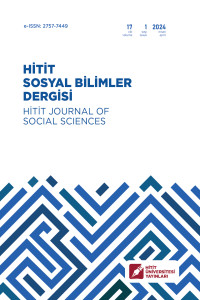Borsa İstanbul Katılım Endekslerinin Etkin Piyasa Hipotezi Analizi: Zayıf Formda Etkinlik İncelemesi
Analysis of Borsa Istanbul Participation Indices under the Efficient Market Hypothesis: Examination of Weak-Form Efficiency
Author(s): S. Öznür Sakınç, İlker SakinçSubject(s): National Economy, Socio-Economic Research, Sociology of Religion
Published by: Hitit Üniversitesi
Keywords: Islamic Finance; Efficient Markets Hypothesis; Weak Form Efficiency; Islamic Indices; BIST Participation Indices;
Summary/Abstract: An index is an indicator that calculates the relative volatility in the costs, prices and sales of listed investment instruments over a period of time. An Islamic index is an index organized in accordance with the legal rules of Islam. It can also be characterized as a stock market index operating within the framework of Islamic rules. Companies with activities such as pork, conventional finance, foreign exchange transactions, interest, alcoholic beverages, tobacco products, gambling, games of chance, silver, adult movies, weapons and gold are not included in the activities of this index. The Efficient Markets Hypothesis (EMH) briefly states that the prices that exist in the markets contain all kinds of information, so that it is impossible to obtain an above-normal return using this information. The aim of this study is to test the weak form efficient markets hypothesis for five BIST participation indices (BIST Participation 30, BIST Participation 50, BIST Participation 100, BIST Participation Sustainability and BIST Participation All indices). There are many academic studies in the international literature that test the weak form efficiency of participation (Islamic) indices. Some of these studies test only Islamic indices, while others test the comparative weak-form efficiency of Islamic and conventional indices. Moreover, the sectoral weak-form efficiency of Islamic indices has also been the subject of research during financial crises. In addition, the efficiency of Islamic indices has been compared in developed economies and Islamic financial markets. In Türkiye, studies on weak-form efficiency testing of local Islamic indices are limited. This study analyzes the weak-form efficiency of BIST Islamic indices. Our study is the first study on the efficiency of Participation indices under the name of BIST. In addition, it is seen that in the previous studies on the efficiency of domestic participation indices, Runs test has not been used as a method. With these features, we believe that the study will contribute to the literature on domestic Islamic indices in Türkiye. In this study, we first aimed to analyze the normal distribution of price series for each participation index selected in the period from 16.11.2021 to 06.09.2023. Descriptive statistical approaches have been used for this purpose, including kurtosis, skewness, and Jarque-Bera statistics. Then, Augmented Dickey-Fuller (ADF) and Phillips-Perron (PP) unit root tests were performed in each time series, whether there were unit roots. Runs tests were also used to determine if the series exhibited a random layout. As data, the returns of the BIST Participation indices (BIST Participation 30, BIST Participation 50, BIST Participation 100, BIST Participation Sustainability and BIST Participation All indices) calculated on the 453 daily closing values between 16.11.2021 and 06.09.2023 were used. The most important reason for choosing these dates is the start of public announcement of BIST participation indices on 16.11.2021. According to the normality distribution results, all BIST participation indices fail to meet the weak efficiency form condition. Moreover, the results of both unit root tests are significant at the 1% significance level for all return series. This implies that the return series of participation indices are stationary. The stationarity of the return series indicates that there is no weak-form efficiency and random. Lastly, according to the runs test there is not a random walk in the series. This study concluded that Islamic indices operating in Türkiye are not efficient in the weak form using three different methods. With these results, it is seen that the markets formed by Islamic indices do not reach the desired efficiency and depth.
Journal: Hitit Sosyal Bilimler Dergisi
- Issue Year: 17/2024
- Issue No: Sp. Issue
- Page Range: 42-53
- Page Count: 13
- Language: Turkish

